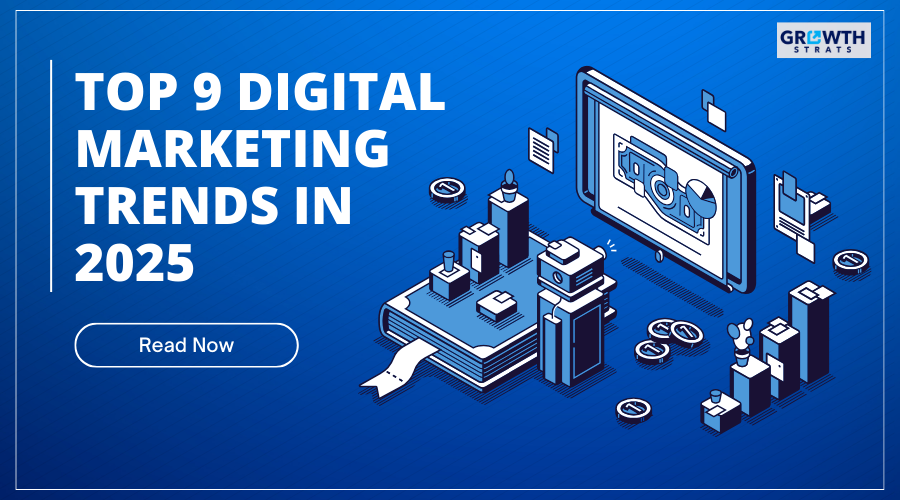The digital marketing landscape in 2025 is rapidly evolving, driven by technological advancements and shifting consumer behaviors. From the rise of AI-powered tools to the growing importance of personalized user experiences, businesses are navigating an era where staying relevant demands constant adaptation.
Adopting the latest digital marketing trends is no longer optional; it’s a critical strategy for gaining a competitive edge. As consumer expectations for seamless interactions and tailored content grow, businesses that embrace these changes can foster deeper engagement and drive better results. Those who lag behind risk losing relevance in an increasingly dynamic market.
Staying updated with the latest trends isn’t just about leveraging new tools—it’s about aligning with the changing pulse of the industry. In 2025, businesses that prioritise innovation and agility are better equipped to meet their goals, adapt to market shifts, and deliver meaningful value to their customers.
Why Digital Marketing Trends Matter
Digital marketing trends play a pivotal role in driving business growth and maximising ROI. By leveraging emerging tools and strategies, businesses can target their audience more effectively, streamline campaigns, and achieve measurable results.
Emerging trends shape consumer behavior by setting new benchmarks for convenience, personalization, and engagement. As consumers adapt to advanced technologies and seamless experiences, businesses must meet these expectations to build trust and loyalty.
For instance, the rise of voice search and immersive media is transforming how audiences interact with brands, creating new opportunities for connection.
Remaining competitive in the digital advertising industry requires keeping pace with these innovations. Companies that stay ahead of trends position themselves as leaders, while those resistant to change risk losing market share.
9 Emerging Trends in Digital Marketing
These trends are not just shaping the digital marketing landscape—they’re redefining how businesses connect, engage, and grow in 2025.
1. Artificial Intelligence (AI) in Marketing
AI is reshaping the marketing landscape with capabilities that go beyond automation, providing insights and efficiencies that were once unimaginable. In content creation, AI tools like ChatGPT help marketers generate blog posts, ad copy, and social media captions quickly and effectively, saving time while maintaining creativity and quality.
AI can even personalise user interactions based on historical data, ensuring every customer feels valued. AI-powered tools are also revolutionising customer support, enabling businesses to use chatbots for real-time assistance.
These bots have become more conversational and context-aware, helping businesses address complex queries while reducing response times. Automated email marketing campaigns now use AI to tailor subject lines, content, and sending times, resulting in higher open and click-through rates.
2. Voice Search Optimization
The proliferation of smart speakers like Amazon Echo and Google Nest and voice assistants such as Siri and Alexa has transformed how consumers search for information.
Voice search queries often differ from traditional text searches; they are more conversational and include complete sentences or questions. As a result, businesses need to adapt their SEO strategies to capture this traffic.
Optimising for voice search involves creating content that answers specific questions concisely. Long-tail keywords, structured data, and local SEO are essential components of a voice search strategy.
Additionally, ensuring that your website loads quickly and is mobile-friendly enhances its accessibility for voice users, boosting visibility and engagement.
3. Short-Form Video Dominance
Short-form videos have become the crown jewels of digital content, dominating platforms like TikTok, Instagram Reels, and YouTube Shorts.
Their quick, punchy format resonates with today’s fast-paced audience, who prefer consuming engaging content in less than a minute. These videos are ideal for storytelling, product launches, and sharing behind-the-scenes glimpses, making them a versatile tool for marketers.
The effectiveness of short videos lies in their ability to grab attention immediately and encourage interaction through likes, shares, and comments. With algorithms favouring such content, brands investing in short-form video campaigns see enhanced visibility, engagement, and conversions.
4. Social Commerce Expansion
Social commerce is redefining the shopping experience, blurring the lines between social media and e-commerce. Platforms like Instagram and Facebook are adding features such as in-app checkouts, shoppable tags, and live-stream shopping, making it easier for users to purchase products directly from their feeds.
For businesses, integrating e-commerce with social media allows them to showcase products in a highly visual and interactive environment, encouraging impulse buying. Leveraging social proof, such as reviews and influencer endorsements, further builds trust and boosts sales. By embracing social commerce, brands can shorten the customer journey and create a seamless shopping experience.
5. Personalized Marketing and Customer Experience
In 2025, personalisation goes beyond addressing customers by name; it involves crafting unique experiences based on behavioural insights, preferences, and purchasing patterns.
AI and machine learning enable brands to predict customer needs and offer tailored solutions, creating meaningful interactions that build loyalty.
Hyper-personalisation extends to every touchpoint—emails, website content, advertisements, and even customer service. For example, personalised product recommendations and dynamic website content make customers feel understood, increasing their likelihood of conversion.
As consumers demand more tailored experiences, businesses that invest in personalisation will stand out in a crowded marketplace.
6. Content Marketing Evolution
The evolution of content marketing emphasises not just creating but curating impactful content that educates, entertains, and inspires.
High-quality, long-form articles that address audience pain points in-depth help establish a brand’s authority and boost SEO rankings. Such content not only drives traffic but also builds trust and credibility over time.
Interactive content is another rising trend, with formats like polls, quizzes, 360-degree videos, and augmented reality experiences capturing audience attention. These formats engage users actively, increasing the likelihood of sharing and retention.
Businesses that adapt their content strategies to include both long-form and interactive elements will thrive in 2025’s competitive digital environment.
7. Influencer and Creator Partnerships
Influencer marketing continues to evolve, with brands shifting focus to micro and nano-influencers. These creators may have smaller followings, but their audiences are highly engaged and niche-specific, making them ideal for building authentic connections.
Collaborations with these influencers are cost-effective and drive higher ROI compared to traditional celebrity endorsements.
Content creators across various niches are partnering with brands for campaigns that feel genuine and relatable.
These partnerships often include co-created content such as tutorials, reviews, and live sessions, which resonate deeply with target audiences. By working with influencers who align with their values, brands can effectively humanise their messaging and build trust.
8. Omnichannel Marketing
Omnichannel marketing is no longer a luxury—it’s a necessity. Consumers expect seamless transitions between online and offline touchpoints, whether browsing a product on a mobile app, receiving an in-store offer, or interacting with a brand’s social media. A unified strategy ensures consistency and convenience, enhancing the overall customer experience.
This approach involves integrating data from multiple channels to provide a cohesive experience. For example, a customer might research a product on social media, receive personalised email offers, and complete the purchase in-store. Such integration not only boosts customer satisfaction but also drives loyalty and repeat business.
9. Emerging Technologies
Web3 technologies, including blockchain and NFTs, are creating new opportunities for transparency and engagement in marketing. Blockchain ensures secure transactions and authenticity, while NFTs enable brands to offer unique, tokenised experiences or products. These technologies are fostering deeper connections and exclusive offerings that attract tech-savvy consumers.
The metaverse is another game-changer, offering immersive environments where brands can engage with audiences in innovative ways.
From virtual storefronts to interactive events, the metaverse allows marketers to create memorable experiences that bridge the physical and digital worlds. As these technologies continue to mature, they promise to redefine how brands connect with their audiences.
How to Prepare for these Trends?
Preparing for emerging digital marketing trends begins with auditing your current strategies. Evaluate your campaigns, tools, and platforms to identify gaps and areas for improvement. Assess performance metrics to understand what’s working and where adjustments are needed, ensuring your approach aligns with evolving consumer preferences and technological advancements.
Adaptability is key to staying ahead. Invest in training your teams to equip them with the skills needed to leverage new tools and strategies effectively. Whether it’s mastering AI-driven analytics, creating voice-optimized content, or embracing short-form video formats, continuous learning ensures your team remains agile in a rapidly changing landscape.
Partnering with an experienced digital marketing agency like ours can help integrate these trends seamlessly into your strategies. Agencies bring expertise, insights, and the latest tools to the table, enabling businesses to adopt innovative solutions without disrupting ongoing operations.
Conclusion
The digital marketing trends of 2025, from AI-driven innovations to the dominance of short-form videos and emerging technologies like the metaverse, are shaping a new era of possibilities. These trends underline the importance of staying ahead, whether through personalised customer experiences, omnichannel strategies, or leveraging social commerce to engage audiences more effectively.
At Growth Strats, we specialize in guiding businesses through the ever-evolving digital marketing landscape. Our expertise ensures that you not only keep pace with emerging trends but also leverage them to achieve significant growth. Partner with us to stay competitive and achieve measurable results in 2025.



